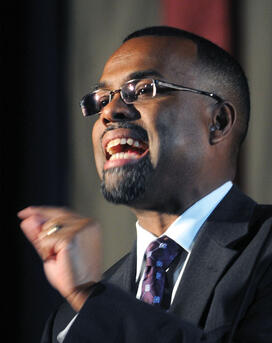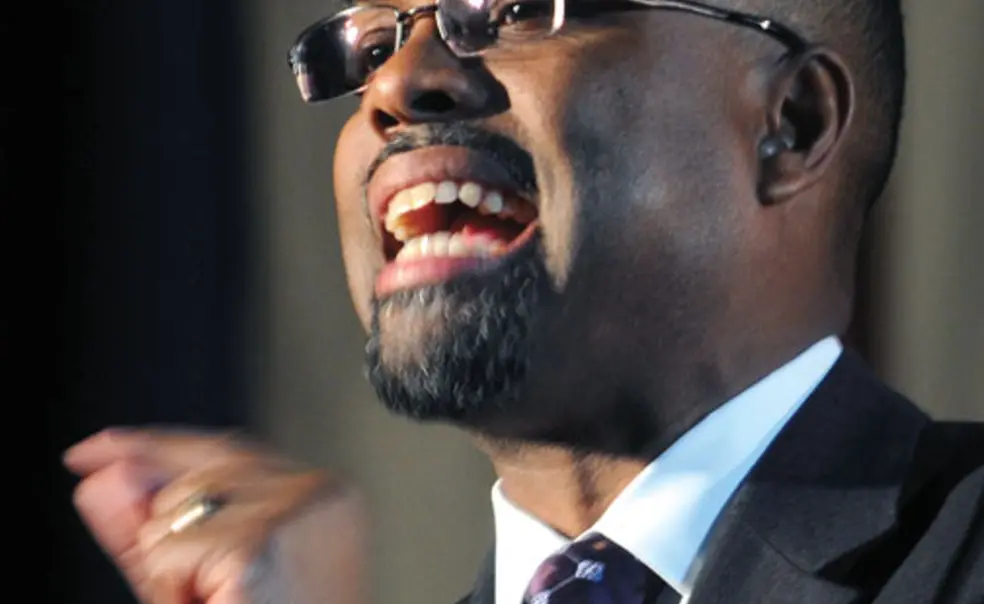Glaude *97 stirs debate on the black church’s role

With a 970-word blog post on the Huffington Post Web site in February, Professor Eddie S. Glaude Jr. *97 sought to start a conversation about the role of the black church. And that he did: The post, titled “The Black Church Is Dead,” has spawned a whirlwind of commentary in the blogosphere, in addition to reports in The New York Times and on NPR.
While acknowledging that black churches still play a major role in the lives of many African-Americans, Glaude argued that “the idea of this venerable institution as central to black life and as a repository for the social and moral conscience of the nation has all but disappeared.”
“The death of the black church as we have known it occasions an opportunity to breathe new life into what it means to be black and Christian,” said Glaude, who chairs the Center for African American Studies. “Black churches and preachers must find their prophetic voices in this momentous present.”
By taking aim at the black church, Glaude set his sights on a hallowed institution in African-American life. In times of slavery and segregation, black Christian churches offered solace and community to a persecuted minority, and they later gave rise to national leaders like Martin Luther King Jr.
What Glaude sought to do with his post was to “look at black churches in light of the complexity of African-American life today,” he said in an interview with PAW.
“It was really about sparking a conversation about the current currency of black churches, debunking the myth of the black church as necessarily prophetic, and offering a place for prophetic voices to be heard,” Glaude said.
If that sound like a lot to cover in a blog post, well, it may be, but the wide-ranging nature of his inquiry is reflected in the responses he has provoked. Perhaps the one point on which his critics agree is that there is no single black church, but many churches.
“I think [Glaude] managed to write an obituary for something that never really existed,” said Wallace D. Best, a friend and colleague who also teaches in Princeton’s religion department and the Center for African American Studies.
“There has never been the black church,” said Best. “The very dynamics and the very diversity of black religion and of black people would have never allowed for such a thing.”
Yet at various points in history, certain black churches have loomed larger in the public consciousness than the rest. “The media tend to pick up on big churches making big statements,” said Emilie M. Townes, a professor at Yale Divinity School and an ordained Baptist minister, citing as examples the Ebenezer Baptist Church (the home of Martin Luther King Sr. and Jr.) and the Trinity United Church of Christ in Chicago, formerly led by the Rev. Jeremiah Wright.
“But I argue that there are lots of much smaller churches really trying to be prophetic voices in their communities,” Townes said.
If scholars agree that there is no such a thing as “the black church,” then why did Glaude’s post cause such a stir? The answer may be political. Part of what prompted the professor’s remarks was the much-publicized mobilization of black Christians against gay marriage (in California) and abortion (in Georgia). “Where are the press conferences and impassioned efforts around black children living in poverty, and commercials and organizing around jobs and health-care reform?” Glaude asked in his post.
Those voices do exist, Glaude contends, but they often are drowned out by their conservative counterparts. If nothing else, the controversy surrounding his remarks suggests that what it means to be a black Christian in the public square is still hotly contested.
Princeton Professor Robert P. George, a former appointee to the U.S. Commission on Civil Rights who has collaborated with black pastors on social-policy initiatives, sees the debate as a sign of the growing gap between African-American intellectuals and black religious leaders.
“From the perspective of the black church leadership, what so many black intellectuals represent is an acceptance ... of liberal social values, which [the leadership] sees as an abandonment of very important core moral values of the church and the tradition,” George said.
George contends that both intellectuals and pastors have “good-faith” disagreements on social questions like abortion and same-sex marriage, and each should be willing to listen to the other.
Glaude hopes that the conversation he has started will extend beyond the African-American community. “It’s a call to Christians to have an argument in public amongst themselves what it means to witness Christ’s sacrifice in our time,” he said.
Townes, for one, does not understand the urgency that underlies Glaude’s post: “There has [been] and always will be, probably, a conservative element in black churches,” she said. “What [Glaude] misses, though, is that it waxes and wanes over time. There have been times historically when black churches have been prophetic, and times when they’ve been more conservative. And there’s always been the counterposition very much alive and well.”
Yet Glaude believes the conversation takes on a renewed importance in light of a political reality: namely, the presence of a black Christian in the White House. Best suggested that the intense media attention on President Barack Obama’s former pastor, Rev. Wright, for his controversial sermons on politics and race may have laid the groundwork for a necessary discussion to take place.












No responses yet